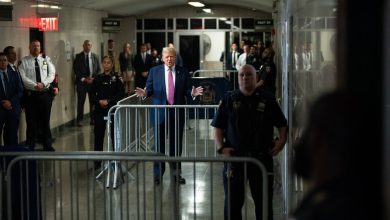Biden v. Musk


Pointing fingersCredit…Oliver Contreras for The New York Times
President Biden’s misguided feud with Musk
Andrew here.
Why does President Biden seek to antagonize Elon Musk?
On Friday, Biden did it again at a news conference at which he dismissed Musk’s worrying view of the economy, with a zinger: “Lots of luck on his trip to the moon.”
Biden’s beef with Musk seems to be a big missed opportunity — politically. By ignoring or poking fun at Musk, he has helped turn the most famed entrepreneur of our time, even if erratic, from being a Biden supporter — Musk voted for him — to a vocal backer of Republicans.
Musk, who has become increasingly polarizing as he has publicly switched allegiances, last month tweeted that he’s moving right, at least for the midterms, because “this administration has done everything it can to sideline & ignore Tesla.”
Biden has seemingly pushed aside someone who should have been a natural ally. You don’t have to like or agree with Musk to appreciate the power of his voice and potential political potency. And that’s true even if you think Musk is being petulant or his partisan shift is partly the result of other forces, or even if you think that he should be the subject of more regulatory scrutiny. Musk has historically backed Democrats, and his entire business is predicated on protecting the climate.
And Musk is could be an unusually powerful enemy: Love him or hate him, he has a loyal, almost religious following. Some of his fans have even tattooed his name, his face and the Tesla logo on their bodies. And he can often control the news cycle with a single tweet.
The Musk and Biden feud started more than a year ago, seemingly sparked by Biden backing auto unions, and unionization more broadly. Biden went so far as to push a provision in a bill that would benefit electric-car makers that are unionized at the expense of those that are not, namely Tesla. He frequently touts hiring figures by the likes of Ford, which last week said it was hiring 6,000 workers, without ever mentioning that Tesla hired nearly 50,000 people around the world in the last two years. (Biden’s latest barb came after Musk said he planned to cut thousands of jobs at Tesla, which Musk later walked back.)
Is there a political calculus that there are enough Musk haters to make this a sound strategy? There are about 14 million Americans who belong to unions in the country. (More than half of voters in unions, on a percentage basis, went for Biden). Musk has nearly 100 million followers on Twitter (many of which, though, are probably bots, and lots who probably don’t agree with Musk’s views or don’t vote, but nonetheless.)
If Biden had brought Musk under his tent — invited him to the White House with other auto C.E.O.s or praised SpaceX’s work for NASA, to name just two examples — Musk has enough of an ego that he most likely would have been turning SpaceX launches into photo opportunities for Biden to wear his Ray-Bans.
Would Biden have been criticized by some on the left for cozying up to a billionaire? Sure. Would some union leaders have gotten upset? Maybe.
Biden and Musk share many of the same policy objectives: namely, technological innovation and investment in green energy. These are the subjects of many battles with a recalcitrant Congress, and Biden has lost a powerful, if unpredictable, backer in his corner.
We want to hear from you.Tell us about your experience with this newsletter by answering this short survey.
HERE’S WHAT’S HAPPENING
Starbucks eyes outside talent for its next leader. The coffee chain’s founder Howard Schultz, who returned to the C.E.O. role in an interim capacity in April, said the company is considering only outside candidates for the top job. Schultz says his plan is to exit Starbucks’s executive ranks within a year.
Elliot Management sues London exchange. The activist hedge fund is seeking nearly half a billion dollars from the London Metal Exchange, which is already under review by British regulators for actions it took earlier this year following wild price swings and a suspension of trading in the nickel market. Elliot and other hedge funds contend that the L.M.E. was wrong to cancel trades that were made before the suspension of trading and could have cost members of the exchange billions of dollars.
Boris Johnson faces a “no confidence” vote. The vote, to be held this evening, was triggered after 15 percent of Conservative members of Parliament joined an effort to recall Johnson. The vote comes in the wake of “partygate,” allegations that Johnson and members of his government broke Covid lockdown restrictions, and as Johnson seeks to rework the protocol that would govern the relationship with Northern Ireland and Britain after Brexit.
Abbott Laboratories resumes baby formula production. Its Similac brand is the largest by U.S. sales, but the company is initially focusing on specialty formulas. Shipments from abroad negotiated by the Biden administration may come in days, though a shortage in stores could persist for weeks.
Apple launches into the metaverse
Apple today unveils the pieces for what it hopes will be its next business-altering device, 15 years after the iPhone. Apple plans to reveal software tools at its annual developers’ conference that would allow apps to add new camera and voice functionality, laying the groundwork for a hands-free interface that customers will eventually be able to navigate on a headset. It could thrust the company into the next frontier of computing at a time when many of its competitors are also looking to the metaverse for growth, report The Times’s Tripp Mickle and Brian X. Chen.
Competition in the metaverse is fierce, and the stakes are high. Microsoft, Google and Facebook’s parent company, Meta, are all in various stages of developing software and hardware to create a new universe where the online, virtual and real worlds coalesce. For Apple, the metaverse could be an opportunity to build new products and experiences around the investments it has already made developing its own shows.
Apple’s software tools and content will help determine its metaverse success. Its last major product, the Apple Watch, was introduced with about 3,000 apps but struggled to take off because tech reviewers said few of those apps were useful. Similar shortcomings have dogged Meta’s virtual-reality headset, the Oculus Quest, which sold over 10 million units last year, because many view it as a gaming device. Services remain crucial for Apple more broadly: As iPhone sales are expected to stall amid factory shutdowns in China, service sales could rise nearly 17 percent to $80 billion.
Cravath heads inside the Beltway
Cravath, Swain & Moore, a top Wall Street law firm whose first partners served President Lincoln during the Civil War, is opening its first Washington office in about 75 years. The office will be led by two former federal regulators: Jelena McWilliams, who chaired the F.D.I.C., and Elad Roisman, an ex-S.E.C. commissioner. The two former regulators, both appointed by President Trump, are joining the firm as partners.
Clients need lots of regulatory help. Cravath’s presiding partner, Faiza Saeed, told DealBook that corporate America is facing more policy pressure than ever from both Democrats and Republicans. That, Saeed said, along with the potential for two high-profile hires, made it the right time for the firm to return to the Beltway.The firm, which has over 500 lawyers and is mostly based in New York and London, has also had Hong Kong and Paris branches in the past, while a previous Washington branch was spun off in the 1940s.
The new branch will be keeping a close eye on crypto. Saeed said cryptocurrencies are one of the reasons for Cravath’s move to D.C. As digital assets get more attention from lawmakers and regulators, law firms are making parallel efforts. Last month, the S.E.C. pledged to nearly double the size of its staff in its crypto assets and cyber unit. Jennifer Leete, who previously helped lead enforcement at the S.E.C., is also joining the new Cravath office in D.C. “Crypto is a hot area,” Saeed said.
How Elon Musk’s Twitter Deal Unfolded
A blockbuster deal. Elon Musk, the world’s wealthiest man, capped what seemed an improbable attempt by the famously mercurial billionaire to buy Twitter for roughly $44 billion. Here’s how the deal unfolded:
The initial offer. Mr. Musk made an unsolicited bid worth more than $40 billion for the influential social network, saying that he wanted to make Twitter a private company and that he wanted people to be able to speak more freely on the service.
The response. Twitter’s board countered Mr. Musk’s offer with a defense mechanism known as a “poison pill.” This well-worn corporate tactic makes a company less palatable to a potential acquirer by making it more expensive for them to buy shares above a certain threshold.
Securing financing. Though his original offer had scant details and was received skeptically by Wall Street, Mr. Musk has been moving swiftly to secure commitments worth $46.5 billion to finance his bid, putting pressure on Twitter’s board to take his advances seriously.
Striking a deal. With the financing in place, Twitter’s board met with Mr. Musk to discuss his offer. The two sides soon reached a deal, with the social media company agreeing to sell itself for $54.20 a share.
Will the deal go through? For the purchase to be completed, shareholders have to vote and regulators have to review the offer first. Scrutiny is likely to be intense and questions remain about Mr. Musk’s plans for the company, especially after he suggested he needs more information on spam and fake accounts on Twitter for the deal to proceed.
“A president has to try. Unfortunately, there are only bad options. And any alternative options are probably worse than asking the Saudis to increase production.”
— Bill Richardson, an energy secretary in the Clinton administration and former governor of New Mexico, on Biden’s decision to travel to Saudi Arabia later this summer, after calling the country a “pariah” on the campaign trail.
NFT start-up OpenSea navigates a wave of fraud
OpenSea, the four-year-old digital marketplace for nonfungible tokens, or NFTs, that has been valued by investors at more than $13 billion, is struggling with hackers and fraud. The company, which has already paid out millions in settlements, faces numerous additional user complaints and lawsuits. And its growing problems come at a time when the market for the briefly buzzy digital assets that it specializes in, and crypto more broadly, has cooled, reports The Times’s David Yaffe-Bellany.
Did OpenSea make NFTs too easy? The promise of NFTs, for artists at least, is that the process of turning digital files into digital assets lets them sell their work online directly to admirers without going through traditional gatekeepers like agents. But OpenSea has made creating NFTs too painless and popular, some artists say.
Company executives admit there is trouble. The executives told The Times that OpenSea has been slow to halt bad actors, making it easy for them to profit off schemes. They said they are adding services to freeze sales of stolen NFTs and ferret out plagiarized works. “Like every tech company, there’s a period where you’re catching up,” said Devin Finzer, 31, OpenSea’s chief executive. “You’re trying to do everything you can to accommodate the brand-new users that are coming into the space.”
But the problems that proliferate on the site demonstrate the downsides of decentralized platforms where anonymity is allowed. Last week, a former OpenSea product manager was charged with insider trading, accused of using anonymous accountants to personally profit off the fact that he knew which NFTs were scheduled to be featured on OpenSea’s home page.
THE SPEED READ
Deals
-
Carl Icahn, after a similar McDonald’s defeat, is dropping his proxy fight with Krogers over the treatment of pigs. (WSJ)
-
JetBlue sweetened its offer for Spirit Airlines as it battles with Frontier Airlines in a bid for the carrier. (Yahoo)
Policy
-
Alexandria Ocasio-Cortez and other Democrats say Amazon is obstructing an investigation into tornado warehouse deaths. (Insider)
-
“How ESG investing came to a reckoning” (FT)
-
Mayors want more power to enforce gun regulations that could limit mass shootings. (NYT)
-
Top finance executives say a tax rule that went into effect earlier this year is making U.S. firms less competitive, and leading to double taxation. (WSJ)
Best of the rest
-
Retailers like Macy’s and Gap have too much pandemic-era stock, like joggers. (WSJ)
-
Hackers stole $360,000 worth of Bored Ape NFTs in the latest in a spate of attacks. (CoinDesk)
-
In a corporate exodus, a record number of companies have moved their offices out of Tokyo. (FT)
We’d like your feedback! Please email thoughts and suggestions to [email protected].



